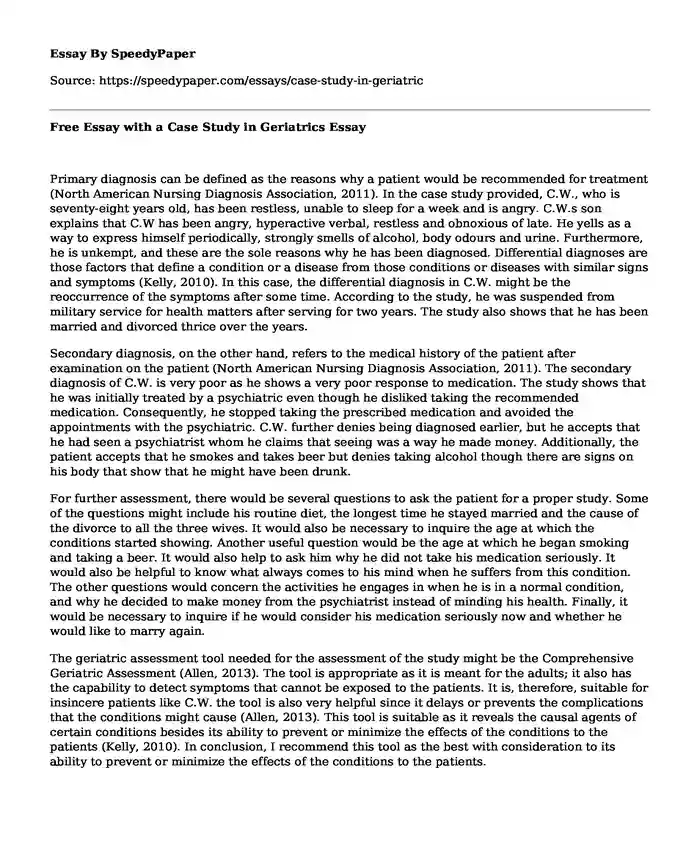
| Type of paper: | Essay |
| Categories: | Health and Social Care Nursing Case study |
| Pages: | 3 |
| Wordcount: | 639 words |
Primary diagnosis can be defined as the reasons why a patient would be recommended for treatment (North American Nursing Diagnosis Association, 2011). In the case study provided, C.W., who is seventy-eight years old, has been restless, unable to sleep for a week and is angry. C.W.s son explains that C.W has been angry, hyperactive verbal, restless and obnoxious of late. He yells as a way to express himself periodically, strongly smells of alcohol, body odours and urine. Furthermore, he is unkempt, and these are the sole reasons why he has been diagnosed. Differential diagnoses are those factors that define a condition or a disease from those conditions or diseases with similar signs and symptoms (Kelly, 2010). In this case, the differential diagnosis in C.W. might be the reoccurrence of the symptoms after some time. According to the study, he was suspended from military service for health matters after serving for two years. The study also shows that he has been married and divorced thrice over the years.
Secondary diagnosis, on the other hand, refers to the medical history of the patient after examination on the patient (North American Nursing Diagnosis Association, 2011). The secondary diagnosis of C.W. is very poor as he shows a very poor response to medication. The study shows that he was initially treated by a psychiatric even though he disliked taking the recommended medication. Consequently, he stopped taking the prescribed medication and avoided the appointments with the psychiatric. C.W. further denies being diagnosed earlier, but he accepts that he had seen a psychiatrist whom he claims that seeing was a way he made money. Additionally, the patient accepts that he smokes and takes beer but denies taking alcohol though there are signs on his body that show that he might have been drunk.
For further assessment, there would be several questions to ask the patient for a proper study. Some of the questions might include his routine diet, the longest time he stayed married and the cause of the divorce to all the three wives. It would also be necessary to inquire the age at which the conditions started showing. Another useful question would be the age at which he began smoking and taking a beer. It would also help to ask him why he did not take his medication seriously. It would also be helpful to know what always comes to his mind when he suffers from this condition. The other questions would concern the activities he engages in when he is in a normal condition, and why he decided to make money from the psychiatrist instead of minding his health. Finally, it would be necessary to inquire if he would consider his medication seriously now and whether he would like to marry again.
The geriatric assessment tool needed for the assessment of the study might be the Comprehensive Geriatric Assessment (Allen, 2013). The tool is appropriate as it is meant for the adults; it also has the capability to detect symptoms that cannot be exposed to the patients. It is, therefore, suitable for insincere patients like C.W. the tool is also very helpful since it delays or prevents the complications that the conditions might cause (Allen, 2013). This tool is suitable as it reveals the causal agents of certain conditions besides its ability to prevent or minimize the effects of the conditions to the patients (Kelly, 2010). In conclusion, I recommend this tool as the best with consideration to its ability to prevent or minimize the effects of the conditions to the patients.
References
Allen, C. (2013). Cultural Diversity Training in a Multidisciplinary Geriatrics Fellowship Program. Gerontology & Geriatrics Education, 15(1), 83-90.
Kelly, G. (2010). The Psychology of Personal Constructs: Volume Two: Clinical Diagnosis and Psychotherapy. London: Routledge.
North American Nursing Diagnosis Association (Ed.). (2011). NANDA Nursing Diagnoses: Definitions & Classification. Kaukauna: Nanda International.
Cite this page
Free Essay with a Case Study in Geriatrics. (2019, May 27). Retrieved from https://speedypaper.net/essays/case-study-in-geriatric
Request Removal
If you are the original author of this essay and no longer wish to have it published on the SpeedyPaper website, please click below to request its removal:
- Free Essay on Bitcoins and Money Laundering
- Free Essay Example on Cultural Norms of the Negro
- 3.5 Data analysis
- Free Essay Sample on Anthropologist Racism
- Essay Example about Romantic and Gothic Elements in Edgar Allan Poe's Poem
- Essay Sample on Responding to Customers' Complaints
- Paper Example: Government Budget Paper
Popular categories




